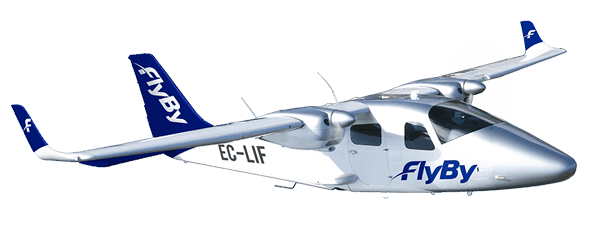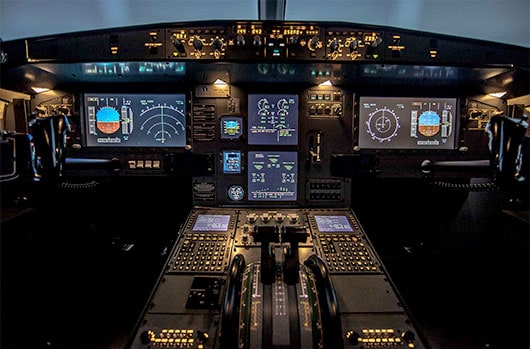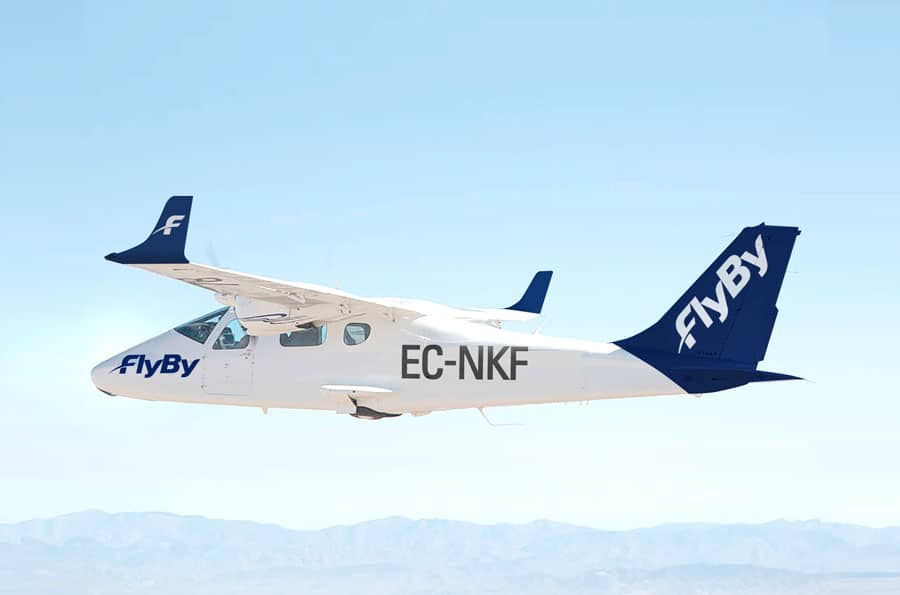All-Inclusive EASA Integrated ATPL
Integrated Airline Transport Pilot License Program
For just €79,500 FlyBy’s All-Inclusive 14 month ab initio Integrated Airline Transport Pilot License (ATPL) programme takes students with little or no previous flying experience and prepares them for a career at an airline anywhere in the world, starting as First Officer right after graduation.

What’s Included in the Course?
- Accommodation for 14 months: Private bedroom in university residences
- 3 meals per day, 7 days per week
- 238 hours of Flight Training
- 812 hours of Classroom Training
- Extended 40-hour APS MCC in an Airbus A320
- Shuttle service between dormitories and airport
- Study material from Bristol Ground School or similar
- iPad with training material
- Initial Class 1 Medical
- All 13 EASA Ground exam fees for ATPL exams in our facilities (1 try per subject)
- EASA Flight skill tests (2 tests total)
- Headset
- Aeronautical Charts
- Access to AIP charts from AENA
- AENA 1:500.000
- Ministry of Defense 1:1.000.000 East and West
- Ministry of Defense 1:2.000.000 IFR Spain
- Flight Manual
- Computer CR3
- Log Book
- Manoeuvres Manual
- Uniform: 2 trousers, 3 shirts, 2 ties, 1 jersey.
- Basic Health Insurance for non-EU nationals required for foreigners (14 months).
Course Highlights
- European EASA ATPL: The most prestigious license in the world
- Duration: Zero to Airline Pilot in 14 months
- Full-time course
- Airline Focused
- Course start date: Every two months
- Fleet of 31 airplanes with 12 more already ordered
- State of the art fleet with Airbus A320 and Tecnam P2006T simulators
- Students and Instructors representing over 107 nationalities
- Excellent Spanish weather allows us to fly all year round
- Instructor Job Opportunity
Course Progression
Prerequisites
Entry Requirements
- Be at least 17 years of age to apply (18 to commence training).
- Be able to obtain an EASA Class 1 medical without restrictions. To be taken upon arrival to Spain.
- Mandatory: Passing our admission tests which include Personality, English, Mathematics and Physics.
- Suggested: Completed secondary or high school education.
Admission Testing
- Aptitude test: Symbiotic ADAPT test
The system features 64 proven aviation specific psychological profiles mapped to 64 specific aviation training organization profiles that integrate for fitting individuals to roles, taking nationality and culture into account. According to the company, ADAPT Online Pilot Selection can be used by aviation organizations anywhere in the world with a wide range of contextual settings for different cultures, languages, specific air domains or environmental situations. Test styles are nondiscriminatory to gender, ethnicity, age or learning backgrounds. - English for non-native speakers. Minimum equivalent level is ICAO 4 and will be tested in our admission tests. No certificate will be acceptable therefore no need to take IELTS, Cambridge, Toefl, First, etc, tests.
- Mathematics & Physics Time controlled tests are compliant with IATA standards.
Prerequisites
Entry Requirements
- Be at least 17 years of age to apply (18 to commence training).
- Be able to obtain an EASA Class 1 medical without restrictions. To be taken upon arrival to Spain.
- Mandatory: Passing our admission tests which include Personality, English, Mathematics and Physics.
- Suggested: Completed secondary or high school education.
Admission Testing
- Aptitude test: Symbiotic ADAPT test
The system features 64 proven aviation specific psychological profiles mapped to 64 specific aviation training organization profiles that integrate for fitting individuals to roles, taking nationality and culture into account. According to the company, ADAPT Online Pilot Selection can be used by aviation organizations anywhere in the world with a wide range of contextual settings for different cultures, languages, specific air domains or environmental situations. Test styles are nondiscriminatory to gender, ethnicity, age or learning backgrounds. - English for non-native speakers. Minimum equivalent level is ICAO 4 and will be tested in our admission tests. No certificate will be acceptable therefore no need to take IELTS, Cambridge, Toefl, First, etc, tests.
- Mathematics & Physics Time controlled tests are compliant with ICAO standards.
Phase I
Months 1 –2: Foundation
Arriving you will begin the Foundation Phase: an introductory into the ATPL subjects.
Our Groundschool training is delivered by experienced pilots and are split-up into two phases in order to make learning easier for you.
Classes will be 5 hours a day, 5 days a week (Monday-Friday). The Foundation Phase will last for two months and it is a theory-only period covering all ground theory required to complete all future flight missions.
We cater for a variety of abilities so our instructors are very adaptable with their teaching; your needs will come first and we will provide you with high quality service. Like in aviation, all classes are taught in English independent of your nationality. During this stage, you will be provided with a number of materials including uniform, iPads, maps, charts, etc.
You will have to pass our school exams at the end in order to move onto Phase II.
Phase I
Months 1 –2: Foundation
Arriving you will begin the Foundation Phase: an introductory into the ATPL subjects.
Our Groundschool training is delivered by experienced pilots and are split-up into two phases in order to make learning easier for you.
Classes will be 5 hours a day, 5 days a week (Monday-Friday). The Foundation Phase will last for two months and it is a theory-only period covering all ground theory required to complete all future flight missions.
We cater for a variety of abilities so our instructors are very adaptable with their teaching; your needs will come first and we will provide you with high quality service. Like in aviation, all classes are taught in English independent of your nationality. During this stage, you will be provided with a number of materials including uniform, iPads, maps, charts, etc.
You will have to pass our school exams at the end in order to move onto Phase II.
Phase II
Months 3 – 10: ATPL Theory and VFR training
This phase is the most demanding as you will be moved to FlyBy’s second operational base in Burgos International Airport and for the next 6 months you will go through intensive VFR training and all 14 ATPL subjects will be taught in-depth.
Once all 13 exams are passed and completed, students only focus on the flying element of their training. During your studies, you will be provided with different platforms to assist your learning – we provide a 1-year subscription to Bristol Groundschool which all our lessons are taught from.
VFR Flight training
The first stage in your flight training will be conducting VFR flights (visual flying). You will become used to the visual references around the airport and become familiar with handling of the aircraft. The early parts of your course will be undertaken with our highly qualified instructors, all leading up to your first solo which you will complete after 20 hours of flight experience, approximately 2 months after starting this phase (only 4 months from start of training!). We will perform a variety of manoeuvres both basic and advanced, including simulating emergency procedures. After your first solo, we will start to move further away from the airfield carrying out first local navigations and then move into cross-country flights; it is at this point where the student then starts to build up their PIC hours (Pilot in Command).
In this phase of flying you will be the opportunity to fly to other airports first with an instructor, and once you are ready, you can then move on to the final phase of VFR flying, the solo cross country stage. You will visit a number of different international airports experiencing different approach charts and traffic patterns. You will interact with air traffic controllers in busy commercial airports.
Before completing your VFR flights, you will perform a triangular flight visiting two airports before returning back to the departure airport – the trip must be 300 nautical miles. You will also experience flying at night with spectacular views.
A requirement as of January 2020 is the Upset Prevention Recurrent Training which will be performed in our aerobatic airplane. You will forge memories you will never forget!
Visual flying is all about looking outside. Being located in the North of Spain we are very fortunate to fly over such beautiful landscape – over mountains, over cities, over the coast. No matter what the season is, we will do our best to fly; so you may fly over snow-covered mountains one day and over sunny beaches the next.
Phase II
Months 3 – 10: ATPL Theory and VFR training
This phase is the most demanding as you will be moved to FlyBy’s second operational base in Burgos International Airport and for the next 6 months you will go through intensive VFR training and all 14 ATPL subjects will be taught in-depth.
School internal exams must be passed when any subject is completed and before you are allowed to take the official exams before the Civil Aviation Authority. Every 2 months students will have the opportunity to take their official exams with Austro Control at FlyBy facilities.
Once all 14 exams are passed and completed, students only focus on the flying element of their training. During your studies, you will be provided with different platforms to assist your learning – we provide a 1-year subscription to Bristol Groundschool which all our lessons are taught from.
VFR Flight training
The first stage in your flight training will be conducting VFR flights (visual flying). You will become used to the visual references around the airport and become familiar with handling of the aircraft. The early parts of your course will be undertaken with our highly qualified instructors, all leading up to your first solo which you will complete after 20 hours of flight experience, approximately 2 months after starting this phase (only 4 months from start of training!). We will perform a variety of manoeuvres both basic and advanced, including simulating emergency procedures. After your first solo, we will start to move further away from the airfield carrying out first local navigations and then move into cross-country flights; it is at this point where the student then starts to build up their PIC hours (Pilot in Command).
In this phase of flying you will be the opportunity to fly to other airports first with an instructor, and once you are ready, you can then move on to the final phase of VFR flying, the solo cross country stage. You will visit a number of different international airports experiencing different approach charts and traffic patterns. You will interact with air traffic controllers in busy commercial airports.
Before completing your VFR flights, you will perform a triangular flight visiting two airports before returning back to the departure airport – the trip must be 300 nautical miles. You will also experience flying at night with spectacular views.
A requirement as of January 2020 is the Upset Prevention Recurrent Training which will be performed in our aerobatic airplane. You will forge memories you will never forget!
Visual flying is all about looking outside. Being located in the North of Spain we are very fortunate to fly over such beautiful landscape – over mountains, over cities, over the coast. No matter what the season is, we will do our best to fly; so you may fly over snow-covered mountains one day and over sunny beaches the next.
Phase III
Months 11-12: IFR training
Once all exams are completed you will continue with the more challenging flights of your training: IFR. This phase cannot commence until all ATPL subjects have been passed.
Flight training begins to get even more intense with the instrumental flying (IFR) and SPIC flights.
During this stage of the course students will focus on the instruments inside the aircraft, controlling the plane whilst navigating and overall improving your cockpit management and multitasking skills. Checklists will be followed; precise procedures will be carried out and students will fly approaches to airports shared with airlines.
The IFR phase starts with SPIC flights allowing you to easily transition to the instrument flying. You will learn to complete interceptions, point to point, DME arcs and holding patterns – all of these you will likely use in your final skills test for your Commercial Pilots Licence. During IFR cross-country trips, you will carry out standard departure and arrival procedures similar to what you will experience in your future airline job.
Phase III
Months 11-12: IFR training
Once all exams are completed you will continue with the more challenging flights of your training: IFR. This phase cannot commence until all ATPL subjects have been passed.
Flight training begins to get even more intense with the instrumental flying (IFR) and SPIC flights.
During this stage of the course students will focus on the instruments inside the aircraft, controlling the plane whilst navigating and overall improving your cockpit management and multitasking skills. Checklists will be followed; precise procedures will be carried out and students will fly approaches to airports shared with airlines.
The IFR phase starts with SPIC flights allowing you to easily transition to the instrument flying. You will learn to complete interceptions, point to point, DME arcs and holding patterns – all of these you will likely use in your final skills test for your Commercial Pilots Licence. During IFR cross-country trips, you will carry out standard departure and arrival procedures similar to what you will experience in your future airline job.
Phase IV
Month 13: Multi Engine Training
Students then move onto multi engine training in more complex aircraft, and work towards taking the final skills test.
When it is time to advance onto the multi engine training, students will incorporate everything they have learnt so far into practice. You will learn to manage with more than one engine, as well as simulating emergencies.
Your final skills test for your Commercial Pilot Licence and Multi-Engine & Instrument Rating will be performed on our Tecnam P2006T twin engine with glass cockpit.
Phase IV
Month 13: Multi Engine Training
Students then move onto multi engine training in more complex aircraft, and work towards taking the final skills test.
When it is time to advance onto the multi engine training, students will incorporate everything they have learnt so far into practice. You will learn to manage with more than one engine, as well as simulating emergencies.
Your final skills test for your Commercial Pilot Licence and Multi-Engine & Instrument Rating will be performed on our Tecnam P2006T twin engine with glass cockpit.
Phase V
Month 14: Airline Pilot Standard MCC
Finally, students move on to Multi Crew Cooperation in our A320 simulator.
The final part of your flight training will be the MCC (Multi Crew Cooperation Course) which teaches you to work with a fellow pilot, how to communicate in a team and handle different complex scenarios.
In order to prepare you for the airlines we offer the 40-hour Extended APS MCC (Multi Crew Cooperation) Course on our Entrol 4000 FNPT II simulator which will give you the opportunity to get familiarised with the Airbus A320 and gain valuable experience. This will be your first time on a jet simulator; again, carrying out instrumental procedures, however, during this part of the training, you will learn how to fly and work with another pilot. You will know how to share your workload with one another, improve your cockpit management skills, and familiarise yourself with some airline procedures.
Phase V
Month 14: Airline Pilot Standard MCC
Finally, students move on to Multi Crew Cooperation in our A320 simulator.
The final part of your flight training will be the MCC (Multi Crew Cooperation Course) which teaches you to work with a fellow pilot, how to communicate in a team and handle different complex scenarios.
In order to prepare you for the airlines we offer the 40-hour Extended APS MCC (Multi Crew Cooperation) Course on our Entrol 4000 FNPT II simulator which will give you the opportunity to get familiarised with the Airbus A320 and gain valuable experience. This will be your first time on a jet simulator; again, carrying out instrumental procedures, however, during this part of the training, you will learn how to fly and work with another pilot. You will know how to share your workload with one another, improve your cockpit management skills, and familiarise yourself with some airline procedures.
Phase VI
Ongoing: End to End Coaching
We closely follow and coach our students from their first day at FlyBy until they are qualified pilots ready to apply for First Officer positions.
- CV Workshops
- LinkedIn profile and networking
- Mock interviews
- Group exercise training
- Airline applications
After completion of this final phase you will graduate and will be ready for the airlines.
Phase VI
Ongoing: End to End Coaching
We closely follow and coach our students from their first day at FlyBy until they are qualified pilots ready to apply for First Officer positions.
- CV Workshops
- LinkedIn profile and networking
- Mock interviews
- Group exercise training
- Airline applications
After completion of this final phase you will graduate and will be ready for the airlines.
Getting Started

Step 1: Pay application fee: € 1,000*
Once the application fee has been paid you will be scheduled for the online assessments.
Click here to start the process and pay your application fee!
Step 2: Take online assessments
The first step of the admission process requires that you take 4 online tests. If you pass all tests and decide to enroll onto the course, the initial €1000 deposit will be discounted off the course price.
Maths/Physics
- If you do not pass the Maths or Physics Tests, you will still be eligible to enroll in the Integrated ATPL course, but we will provide you with additional training material to study before starting the course.
English
- If you do not pass the English test, you will be required to improve your English proficiency skills by enrolling in an intensive English course in your home town. We would also recommend you consider moving temporarily to an English speaking country to accelerate learning.
Personality
- If you DO NO pass the Personality Tests, we will refund you €700, but no training will be offered.
Step 3: Pay enrollment fee: €19,000*
Once you have been formerly admitted onto the course you will be invited to enroll. The enrollment fee is €18,600* and must be transferred one month before starting your course. All non-EU citizens must transfer the enrollment fee to receive Letter of Acceptance required for visa application process. Please note that visa application process may take up to 2 or 3 months although in the odd occasion it has been completed in as little as 4 weeks.
*These fees are inclusive of the total course price.
Step 4: Select a package
We offer the following package options of your choice that include accommodation, meals and/or transport to and from the airport:
14 Month Integrated ATPL
| Package | Course Price** | Monthly X 14 | Accom. | Meals | Shuttle |
|---|---|---|---|---|---|
| A | €79,500** | €4,250 | X | X | X |
| B | €78,520** | €4,180 | X | X | |
| C | €76,280** | €4,020 | X | X | |
| D | €75,300** | €3,950 | X | ||
| E | €72,080** | €3,720 | X | ||
| F | €71,100** | €3,650 |
**These prices include the prerequisite fees.
What’s included:
Our prices include VAT, all training, accommodations, iPad, and more! No hidden Fees!
Accommodations
Accommodation for 14 months in a single bedroom. Students stay in one of our residences in the centre of town and are shuttled to the Airport / classroom site for ground lessons and flight training.
Meals
Each student receives 3 meals per day, 7 days per week.
Shuttle Service
Shuttle service between dormitories and airfield for 12 months (no flying during first 2 months).
Materials, iPad/computer, tests/fees and manuals
- Study material from Bristol Ground School or similar (12 month subscription)
- iPad
- Ground exam fees for ATPL exams with AustroControl in our own facilities! (1 try per subject)
- Flight skill tests (2 tests total)
- Headsets (1 set)
- Initial Class 1 Medical
- Aeronautical Charts
– Access to AIP charts from AENA
– AENA 1:500.000
– Ministry of Defense 1:1.000.000 East and West
– Ministry of Defense 1:2.000.000 IFR España - Flight Manual
- Computer CR3
- Log Book
- Maneuvers Manual
If any material is damaged, the student will be charged with the cost of replacement plus 15% for admin costs.
Uniforms
Uniform Includes:
- 2 trousers
- 3 shirts
- 2 ties
Basic Health Insurance
Basic Health Insurance required for the Spanish ID for foreigners (14 months). Only for non-EU nationals!
“We are very fortunate in Flyby, we fly very regularly, up to 4-5 times a week which is a lot more compared to most schools!”



